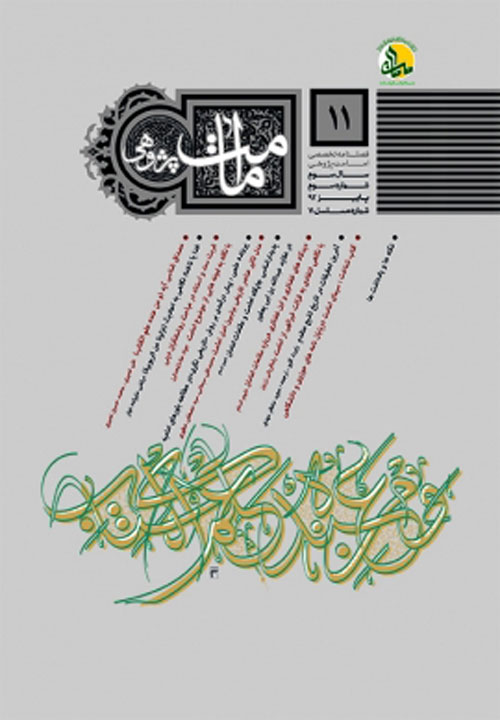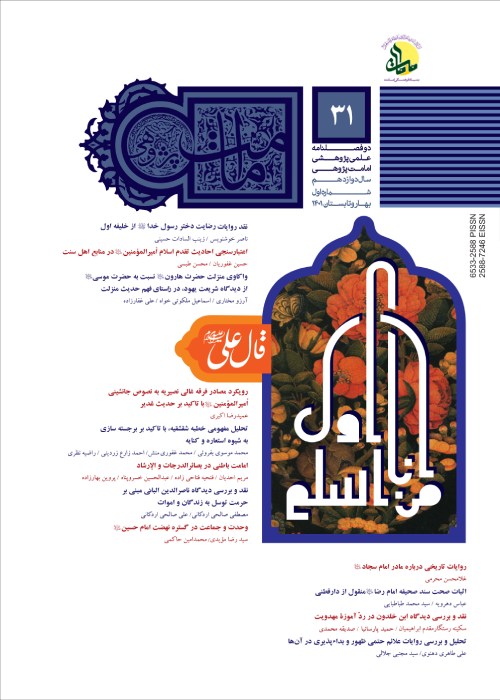فهرست مطالب

نشریه امامت پژوهی
پیاپی 11 (پاییز 1392)
- تاریخ انتشار: 1392/10/25
- تعداد عناوین: 11
- مقالات
-
صفحه 9ازجمله موضوعاتی که میان مفسران شیعه و شماری از مفسران اهل سنت، مورد اختلاف واقع شده، مصداق شناسی آیه <من عنده علم الکتاب> است. مفسران شیعه و شماری از عالمان اهل سنت مصداق این آیه را حضرت امیر علیه السلام می دانند؛ اما در برابر، برخی از مفسران اهل سنت، عبدالله بن سلام، عالمان یهود و نصارا و تمام مومنان را سه مصداق دیگر آیه دانسته اند. این مقاله با بررسی دیدگاه های مختلف مفسران فریقین و تحلیل آنها، تطبیق آیه بر مصادیقی غیر از حضرت امیر را موردنقد قرار داده و مدعای مفسران شیعه را مورد تاکید قرار داده است. وجود روایات اهلبیت علیهم السلام، صحابه و تابعان که حضرت امیر را تنها مصداق آیه دانسته اند، گستردگی دانش امام و عدم سازگاری تطبیق آیه بر مصادیقی دیگر با اسناد تاریخی، ازجمله اشکالات وارد بر دیدگاه مفسران اهل سنت است.
کلیدواژگان: علم الکتاب، علم حضرت امیر، گستره علم امام، عبدالله بن سلام، مفسران فریقین -
صفحه 39در منابع شیعی، از امامان معصوم حدیثی نقل شده است به این مضمون که «ما را خدا ندانید و هر چه خواستید در فضائل ما بگویید». این روایت علی رغم اینکه از سوی برخی جریان های فکری مورد انکار قرار گرفته و حدیثی ساختگی قلمداد گشته، دارای سندی معتبر و دلالتی مطابق با موازین دینی است. متن این روایت به الفاظ گوناگونی در میراث حدیثی شیعه وارد شده و مدلول آن در دو جهت خلاصه می شود؛ نفی غلو و تبیین دامنه ی مقامات اهل بیت علیهم السلام. این روایت، از سویی به مبارزه با افکار غالیانه پرداخته و از سوی دیگر به بلندی مقام و جایگاه امامان معصوم علیهم السلام اشاره دارد. نوشتار پیش رو پس از بررسی متنی و سندی این احادیث، به تبیین دلالت آن پرداخته و به اشکالاتی که بر آن وارد شده پاسخ می دهد.
کلیدواژگان: حدیث نزلونا، فضائل، امامان معصوم، غلو، غالیان -
صفحه 81در مباحثی که طی دهه های اخیر، توسط گروه موسوم به روشنفکران دینی ارائه شده موضوعات دینی فراوانی، ازجمله در حوزه عقاید اختصاصی شیعی، به چالش کشیده شده است.
افزون بر نقدهایی که به حسب مورد، بر این مباحث بیان و نگاشته شده، می توان به برخی ضعف های ساختاری رایج در آن ها اشاره کرد.
یکی از این موارد، ضعف و نقص در سند دهی است تا جایی که گویا گاهی، ضرورت استناد در ادعاها، امری غیرضروری یا فرعی و حاشیه ای دانسته شده و آنچه مبنا و دارای اهمیت تلقی می گردد، صرفا ارائه نظریه در چارچوب های خاص است. این کاستی روشی می تواند به نتایج بسیار نامطلوبی منجر شود.
در این نوشتار، آسیب یادشده را ناظر به یک مقاله و سخنرانی، با استناد به مناظره ای که با مولف آن مقالات داشته ام، بررسی خواهم کرد.
کلیدواژگان: سند، امامت، استناد، روشنفکری، فراستخواه - پرونده علمی
-
صفحه 109
-
صفحه 115بی تردید ارائه و تبیین آموزه های عمیق شیعه که ریشه در کتاب و سنت دارند، نیازمند بستری مناسب است که تحقق آن در ارتباط مستقیم با همسویی یا عدم همسویی عناصر اثرگذار تاریخی یا همان اجزاء سیاسی، اجتماعی، فرهنگی و اقتصادی است.
تاملی در این عناصر، بر تاثیر آن ها در روند ارائه اجمالی _ تفصیلی دستگاه معرفتی شیعه و تبیین آن در دوره های مختلف حضور امامان _ بدون پیدایش تغییر در مبانی آن _ مهر تایید می نهد.
نوشته پیش رو تلاش دارد تا نظریه فوق را به صورت تطبیقی در مورد آموزه امامت بر اساس روایات اهل بیت ارائه نماید که در آن ضمن پاسخ به چرایی برخی پدیده های تاریخی _ معرفتی، چگونگی روند مذکور را پیش از دوران غیبت، آن چنانکه منظومه معرفتی اهل بیت در نهان دارد، نشان دهد.
کلیدواژگان: اهل بیت، امامت، روایات شیعه، عناصر تاریخی، تبیین عقیده، تبیین اجمالی، تفصیلی -
پدیدار شناسی جایگاه امامت و مقامات امامان؟عهم؟ / در عقاید عبدالله بن ابی یعفورصفحه 163اعتقاد به امامت، سنگ بنای اصلی تفکر شیعه به شمار می رود. به دلیل همین اهمیت، در میان اصحاب ائمه علیهم السلام، اظهار یا عدم پرده برداری از برخی مقامات و فضائل اهل بیت علیهم السلام باعث شده است که فرقه نگاران اسلامی، شیعیان را در فرقه های نسبتا متعددی دسته بندی کنند. عبدالله بن ابی یعفور یکی از بزرگ ترین اصحاب امام صادق علیه السلام است که روایات فراوانی از وی در موضوعات مرتبط با امامت نقل شده است. برخی از نویسندگان جدید با استناد به چند گزارش تاریخی، تلاش نموده اند از او به عنوان نمونه ای از معتدلین شیعه تعبیر کنند که اعتقادی به مقامات الهی اهل بیت علیهم السلام نداشته است. این نگاه که رویکردی تاریخی داشته و با اکتفا به حداقل گزارش ها شکل گرفته است موجب گردیده تا به عنوان دستاویزی بر تکاملی بودن باورهای شیعی و نیز وجود اختلاف عقیدتی در میان اصحاب معاصر ائمه علیهم السلام مورد استناد قرار گیرد. نوشتار پیش رو در پی آن است که با بررسی روایات رسیده از عبدالله بن ابی یعفور، به صورت پدیدارشناسانه به دیدگاه دقیق وی در موضوع امامت دست یابد. همچنین در این مقاله، روش تاریخی مورداستفاده در نوشته های مذکور نیز به عرصه چالش و نقد علمی کشیده شده است.
کلیدواژگان: عبدالله بن ابی یغفور، مقامات امامان، امامت، علمای ابرار -
دیدگاه های غضائری و ابن غضائری درباره مقامات امامان؟عهم؟ / با نگاهی انتقادی به قرائت غیر الهی از امامتصفحه 207
-
صفحه 235
- کتاب شناخت
-
صفحه 299
-
صفحه 361
-
Page 9Among the issues which is debated between Shi’i exegetes and some of Sunni exegetes are the references of the verse “Allah, and whosoever hath knowledge of the Scripture, is sufficient witness between me and you”. Shi’i exegetes and some of Sunni exegetes are of the opinion that the reference of this verse is Imam Ali (A.S). On the other hand, some Sunni exegetes think that ‘Abdullah Ibn Salam, Jew and Christian scholars, and “all believers” are three more references of this verse.Studying various views if the Sunni and Shi’i exegetes and analyzing these views, this article has criticized applying the verse to references other than Imam Ali (A.S) and emphasized the claim made by Shi’i exegetes. Hadiths quoted from the Household (A.S), Companions, and Followers who have regarded Imam Ali (A.S) as the only reference of this verse, extent of the Imam’s knowledge, disagreement between applying the verse to other verses on the one hand and historical documents on the other are among objections posed against the view adopted by Sunni exegetes.
-
Page 39In Shi’i sources, the following hadith has been quoted from the Infallible Imams: “Do not consider us as god and narrate whatever you want of our virtues”. Though this hadith has been rejected by some schools of thought as a forged one, it has valid chain of narrators and its references correspond to religious standards. This hadith has been narrated in various forms in Shi’i sources and it is referring mainly to two points: first, rejection of extremism; and, the other, explanation of the scope of stations of the Household (A.S). On the one hand, this hadith fights against extremist ideas and, on the other, it mentions the loftiness of the stations of the Infallible Imams. After discussing the content and the chain of narrators of this hadith, the present writing goes to explain its references and provide replies to objections posed against it.
-
Page 81In discussions made by religious intellectuals in the recent years- in spite of the existing debates about this term [religious intellectuals] and diversity of their approaches-, many religious issues including those which fall within the field of particularly Shi’i ideas have been challenged. Apart from certain critiques already posed against these challenges, some prevalent structural weak points in them may be mentioned.One of such points concerns weakness in making references so that it may be said that it is as if necessity of making reference to evidence for claims has been deemed as something marginal or non-necessary and what that is considered as being of importance is to provide some theories within particular frameworks. This methodological defect may lead to very unfavorable consequences.In the present writing, the author makes references to one of such articles and, referring to a debate with the author of that article, he will discuss the above defect.
-
Page 115IIt goes without saying that to provide and explain profound Shi’i teachings which have their roots in the Book and Sunnah, a suitable ground is needed whose realization is directly related to agreement or disagreement between influential historical elements on the one hand and those political, social, cultural, and economic elements, on the other.A reflection upon these elements confirms their impacts on the process of brief-detailed presentation of epistemic Shi’i system and its explanation in various eras of the Imams’ presence- without a change in its origin. The present writing tries to comparatively present the above theory about “Imamate” based on hadiths quoted from the Household (A.S); and, while providing replies to the questions about the reasons behind some historicalepistemic phenomena, the author will show developments of the abovementioned process in the era before Concealment as it is contained in the epistemic system of the Household (A.S).
-
Page 163Belief in Imamate is the cornerstone of Shi‘i thought. Because of this importance and the fact that companions of the Imams (A.S) revealed or concealed some stations and virtues of the Imams (A.S), those who have written about various Shi‘i groups have classified them under numerous sects. ‘Abdullah Ibn AbiYa’fur is one of the greatest companions of Imam Sadiq (A.S) who have narrated many hadiths about issues concerning Imamate. Relying upon some historical reports, some modern authors have tried to regard him as being among moderate Shi‘is who do not believe in Divine stations of the Household (A.S). Because of its historical approach and since it has sufficed to a very small number of reports, this view has been used as an evidence for the claim that Shi‘i beliefs are of an evolutionary nature and there are some ideological disagreements among companions contemporary to the Imams (A.S). The present writing tries to discuss hadithsnarrated by ‘Abdullah Ibn AbiYa’fur and, in this way, find a more accurate idea about “Imamate”. Also, in the present article, the historical methodology used in the above-mentioned writings has been scientifically criticized and challenged.
-
Views of Ghaza iri and Ibn Ghaza iri concerning Stations of the Imams (A.S) A Critical / View to non-Divine Reading of ImamatPage 207Imamate as well as perfections and virtues of the Imams (A.S) are among most important ideological issues and have created many encounters in the course of Shi’i history. To get familiar with views of earlier Shi’i scholars and muhaddithun in historical analysis of Shi’is’ ideas is of paramount importance. Ghaza’iri and his son were among great scholars of biographies of scholars of religion (science of rijal). They were familiar with writings of their contemporary Shi’is. For this reason, their views about stations of the Imams (A.S) and the limits of extremism are of importance. Because of the ideas of some of our contemporaries who are of the opinion that most earlier scholars- and in particular Ibn Ghaza’iri- have provided a non-Divine reading of the position of Imamate, this view assumes much more importance. In the present article, relying upon historical evidence, hadiths narrated by Ghaza’iri and the book al-Du‘afa which is ascribed to Ibn Ghaza’iri, the author has shown that Ghaza’iri and Ibn Ghaza’iri believe that Imam is appointed by God and Imams (A.S) enjoy perfections such as infallibility, God-given knowledge, knowledge of the hidden, and extraordinary capabilities. Since no independent work written by them has been handed down to us, perfections such as knowledge of the hidden and the like can be accurately judged; however, they confirmed such perfections and did not consider [belief in] them as extremism.


